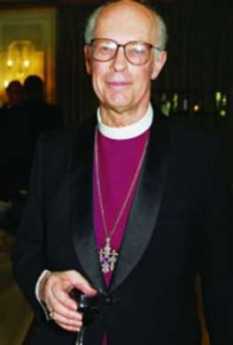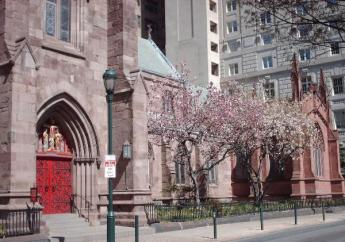Related Topics
Religious Philadelphia
William Penn wanted a colony with religious freedom. A considerable number, if not the majority, of American religious denominations were founded in this city. The main misconception about religious Philadelphia is that it is Quaker-dominated. But the broader misconception is that it is not Quaker-dominated.
Volunteerism
The characteristic American behavior called volunteerism got its start with Benjamin Franklin's Junto, and has been a source of comment by foreign visitors ever since. It's still a very active force.
Indigents
With a long history of welcoming and assisting the poor, Philadelphia has always risked swamping the lifeboat by attracting more of them than it can handle.
Right Angle Club 2008
A report, to the year 2008 shareholders of the Right Angle Club of Philadelphia, by the outgoing president, Neale Bringhurst...
Bridges
New topic 2018-03-02 16:37:09 description
Urban Bridges

|
| Reverend Mary E. Laney |
The Reverend Mary E. Laney recently told the Right Angle Club about her experiences in an Episcopal mission church, along with the history behind this innovation, and the establishment of a 501(c)(3) organization to help the idea on a national level. That may mean no more to readers of this site than at first it probably did to the Right Angle Club, before Mary Laney made it all come alive. It was quite moving.

|
| Bishop Alan Bartlett |
During the 1980's she asked Bishop Alan Bartlett, at that time the Bishop of Eastern Pennsylvania for the Episcopal Church, if she might be assigned to an urban mission. As ethnic and religious population migrated around the Philadelphia landscape, quite a few Episcopal churches have been stranded in economically depressed neighborhoods, unable to afford a full-time pastor. The concept of a mission church was developed as a designation for churches that had dwindled to the point where only a handful of parishioners were left and were assigned to a category in which the Bishop would appoint a part-time Vicar to be in charge of what then needed financial support from the main church. Although in a sense Bishop White started the idea two hundred years earlier, there were no mission churches in Philadelphia in colonial times, but there are now over fifty of them, a quarter of the Episcopal churches in the region. Reverend Lancey was assigned to St. Gabriel's at the corner of Front Street and Roosevelt Boulevard, and stayed there fifteen years. She is now with St. Christopher's in Gladwynne.
The initial concept was to identify eight lead mission churches, build them up to be self-sustaining, and then replace them with eight new ones. With all good will and hard work in the world, this concept failed, largely because the social conditions of the poor at that time also depressed their educational level, and had instilled in them a culture of constant failure. In one telling episode, the parishioners said there was no hot water in the church. As a matter of fact, the pilot light of the hot water heater had gone out, and the parish was so sunken in the mindset of failure and despair they had not even looked into it. Mary Laney decided something had to be done to change the model.
What seems to have worked was the creation of a 501(c)(3) organization called Urban Bridges. The original idea behind this organization was that since the Constitutional separation of church and state precluded government grants to church no matter how struggling, but perhaps a tax exemption would make it possible for private donations to accomplish what was needed. There was, in addition, the sad experience that whenever the constitution barriers had somehow been overcome by circumvention, the many layers of bureaucracy usually consumed the money. It had proved disheartening to see four or five years go by after a government grant, with not a cent getting to the programs and all consumed by consultants, advisers and supervisors.
Meanwhile, the poor parishioners continued to base their hopes on this sort of relief, while neglecting things which might be more effective.
The Urban Bridges program evolved from a primarily fund-raising organization into a system of partnerships between prosperous suburban churches and the struggling urban missions. The suburban churches proved to be inspired with a wish to help but frustrated by a lack of means to do anything effective. It thus evolved that the suburban Episcopal churches supplied what was really most needed: practical examples of leadership on a local level, combined with visible evidence of successful effort. Literacy courses, drum and bugle instruction, computer tutoring and a variety of other spontaneous activities led to the example of leadership, and in the long run, was a far more effective fund-raising tool than printed appeals and button-holing. Even in the case of crime, it was the leadership that made the difference.

|
| St. Christopher's Church |
The story was told of a drug dealer in the neighborhood who dominated the streets with dogs and blocked access to schools unless the children agreed to sell drugs for him. Local police had proved unhelpful, and hopelessness was rampant. What would prosperous suburbanites do in such a situation? Obviously, suburbanites would not stand for such a situation and called in the Federal Drug Enforcement Agency. The crook was promptly deprived of his dogs and now resides in jail. That may not be wholly in the spirit of peaceful reasoning, but it's the American Way, all right. This was what seemed to be missing in the culture of poverty. It's the determination that whatever the cost, intolerable things will not be tolerated, combined with absolute faith that the system does provide ways to be effective without becoming either lawless or wards of the state. This is America, right?
Originally published: Sunday, July 20, 2008; most-recently modified: Friday, May 31, 2019